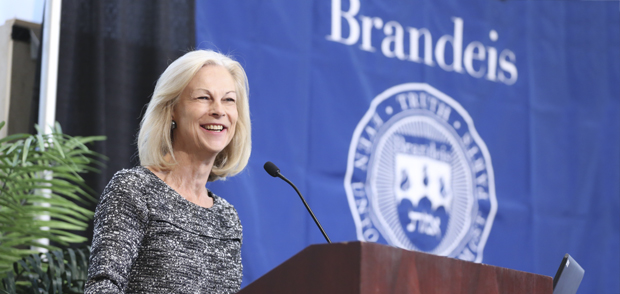A comic connection: Hugh Hefner and Lenny Bruce
A two-day conference on the legacy of Lenny Bruce was opened with a keynote address from Christie Hefner ’74
 Photo/Mike Lovett
Photo/Mike LovettChristie Hefner '74.
Lenny Bruce and Hugh Hefner had a lot in common.
They shared a place on the forefront of the tidal wave of cultural change that occurred in the late 1950s and 1960s. They shared a determination to fight for freedom of expression, even when those fights left them entangled with the legal system.
They also shared a friendship, said Christie Hefner ’74, Hugh's daughter and former chairman and CEO of Playboy Enterprises.
"Like contemporary art and contemporary jazz, Hef dug Lenny," Hefner said Thursday.
In the keynote address that kicked off "Comedy and the Constitution: The Legacy of Lenny Bruce," a two-day symposium dedicated to the study of Bruce, Hefner described the many intersections between her iconic father and the iconic comic.
Hefner recalled how her father was so impressed with Bruce when he saw him perform in San Francisco in 1958 that he decided to use his influence in the Chicago nightclub scene to have Bruce play in some of the city's premiere clubs. Bruce was also profiled in Playboy Magazine, which later excerpted and then published his book, “How To Talk Dirty and Influence People.”
Both were dragged through prolonged legal battles as they fought to protect their first-amendment rights, but Bruce faced an additional burden as he lacked an organization with enormous resources to help him, Hefner said.
"In Hef’s battles, he had a large company behind him and a powerful platform in the magazine. Lenny had none of that. Just friends," Hefner said. "Hef was one of those friends who believed in Lenny, and who stood with him in good times, bad times, unpopular times and all times. Because alone among those rebellious artists, those talented men and women who were his contemporaries, Lenny Bruce was persecuted and prosecuted for his words and his ideas."
Bruce's commitment to his ideas and his craft resulted in an impact on the world of comedy that is still felt today. Society turns to comedians not only for comedy, but for critical perspective, Hefner said, and that's a testament to Bruce's legacy.
"We live in a time when Lenny’s comic bloodlines have flourished like never before," Hefner said. "Much of the comedy that we hear today was pioneered by Lenny. Comedy that similarly channels and challenges the contemporary zeitgeist."
The symposium, organized by Sarah Shoemaker, associate university librarian for Archives and Special Collections, and Stephen Whitfield, the Max Richter Professor of American Civilization, marked the formal opening of the Lenny Bruce collection at Brandeis' Archives and Special Collections, which features Bruce’s personal papers and recordings.
Thanks to a grant from the Hugh M. Hefner Foundation, the university acquired the papers in 2014 from Bruce’s daughter, Kitty, who attended the symposium and shared some personal memories of her father. She was joined by Hefner and Brandeis University President Ronald Liebowitz in a ceremonial ribbon cutting that opened the collection to the public.
"I find it quite appropriate that Brandeis, with our motto of 'Truth, even unto its innermost parts,' is now home to the personal papers of an individual who deeply believed in that same ideal, even to the point of persecution," Liebowitz said. "We are honored to have been chosen as the keepers of this historic collection and we look forward to the scholarly opportunities it will provide to researchers for years to come."
Categories: Alumni, Humanities and Social Sciences, Student Life





